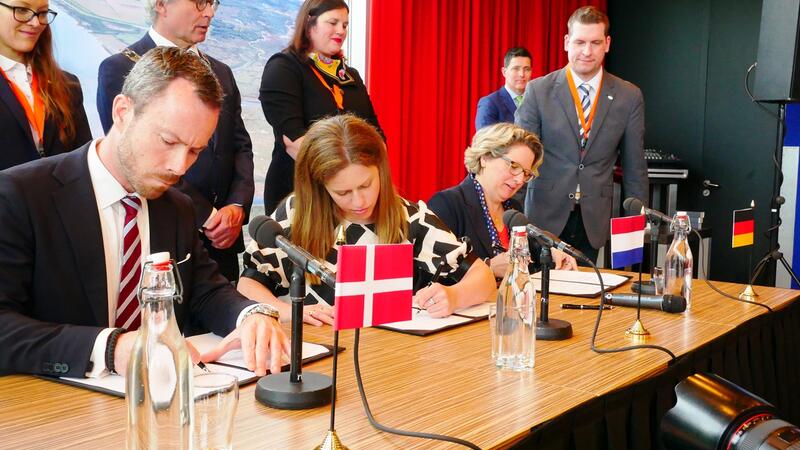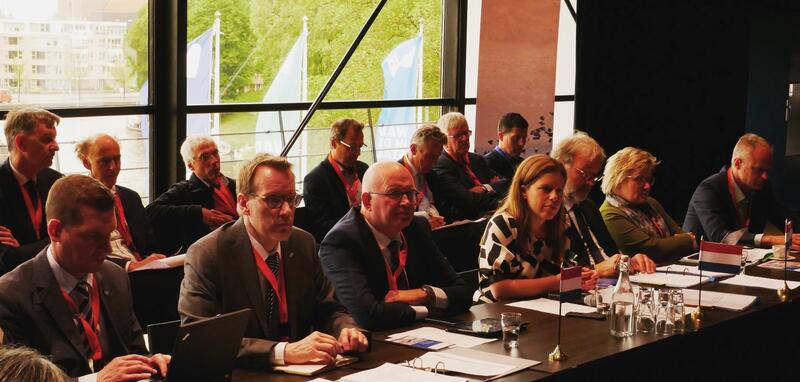Wadden Sea ministers discuss trilateral future in Leeuwarden

The Wadden Sea countries want to preserve and enhance the Wadden Sea World Heritage as a refuge for breeding birds. Fish diversity needs to get back to its former level and a single integrated management plan is to be developed. These are some of the outcomes of the 13th Trilateral Wadden Sea Conference, held in Leeuwarden, Netherlands, on 18 May 2018. The three ministers of the Wadden Sea states Jakob Elleman-Jensen (Danish Minister for Environment and Food), Carola Schouten (Dutch Minister of Agriculture, Nature and Food Quality) and Svenja Schulze (German Federal Minister for the Environment, Nature Conservation and Nuclear Safety) adopted the ‘Leeuwarden Declaration’, which formulates key points for the next four years of the Trilateral Cooperation on the Protection of the Wadden Sea (TWSC). The Conference marks the end of the Dutch and the beginning of the Germany presidency of the Cooperation. Germany will hold the Presidency until 2022.
Every three to four years the so-called Trilateral Governmental Council meets in the framework of a Trilateral Governmental Conference, forming the main decision-making body of the TWSC. At the Conference, the ministers responsible for the protection of the Wadden Sea and their delegations discussed Wadden Sea matters, and provided political guidance for the coming years.

Minister Schouten (front row, 4th from left) chaired the Council meeting.
Outcomes of the meeting
Thus, the Council agreed step up work on the Single Integrated Management Plan for the Wadden Sea as one ecological entity that UNESCO requested the Wadden Sea states to elaborate. The development of the plan will be a main focus of the German presidency.
The ministers welcomed the trilateral education strategy for the Wadden Sea World Heritage. The strategy was developed by education experts, from WWF, the Wadden Sea visitor centres and other organizations in the framework of the International Wadden Sea School (IWSS). The strategy was signed by representatives of the delegations.
The Council also instructed to undertake further steps towards a Trilateral Management and Action Plan Alien Species (MAPAS). And topics such as climate change and breeding birds also figure high on the trilateral agenda for the next four years.
During a Wadden Sea Conference open to stakeholders of the region a Swimway Vision was signed. The corresponding Swimway Initiative has been established by the countries in response to the decrease in fish diversity to study the life cycle of various fish species in the Wadden Sea. The presentation was accompanied by representatives of three school classes from Denmark, Germany and the Netherlands, who presented their advice for the Wadden Sea to the ministers. Summaries of the strategy and vision are annexed to the Leeuwarden Declaration.
Scientific community and international guests
During a conference side event, the Wadden Sea scientific and research community presented their Trilateral Research Agenda to the ministers. The agenda, which is the product of several years of intensive trilateral consultations across scientific disciplines identifies pressing research fields and questions. The Agenda was welcomed by the Council.
Delegations from Mauritania and South Korea also participated in the Conference. The Trilateral Wadden Sea Cooperation has signed Memoranda of Understanding with and successfully cooperated with both countries for many years. Like the Wadden Sea, the Mauritanian National Park Banc d’Arguin is a globally significant resting site for migratory birds on the East Atlantic Flyway. The Korean west coast is characterized by a tidal flat system ecologically comparable to the Wadden Sea.
The Ministerial Council appointed the former Director of the Alfred Wegener Institute (AWI) Professor Karin Lochte as the new Chairperson of the Wadden Sea Board. Lochte takes over from Co Verdaas, who has served in this position for the past four years.
Statements of the Wadden Sea Ministers
Minister Elleman-Jensen: The Wadden Sea is the world’s largest tidal area and the only sea area in Denmark that is on UNESCO’s World Heritage list. It is a priceless piece of nature, and Denmark has had a good and long-term cooperation with the other countries that border the Wadden Sea in order to protect it. I look forward to a new chapter of that cooperation.
Minister Schouten: The Netherlands, Germany and Denmark have been working together to protect the Wadden Sea for 40 years. It makes me proud to see how much we have accomplished, such as the fact that the entire Wadden Sea is now part of the World Heritage List. But we are not there yet. Together with my German and Danish colleagues I want to expand the cooperation between governments, the private sector and nature organisations. Judging from the input of all the different parties today I am positive that we can achieve even more.
Minister Schulze: The Wadden Sea is a globally unique nature area and surely deserves the title World Heritage. This gives us a global responsibility, particularly for the millions of migratory birds who use the Wadden Sea every year as a staging area to rest and feed before continuing on to the Arctic or Africa. For this reason we will further develop the cooperation with these regions in the upcoming years. Because only together can we achieve our goal of protecting this unique ecosystem.
